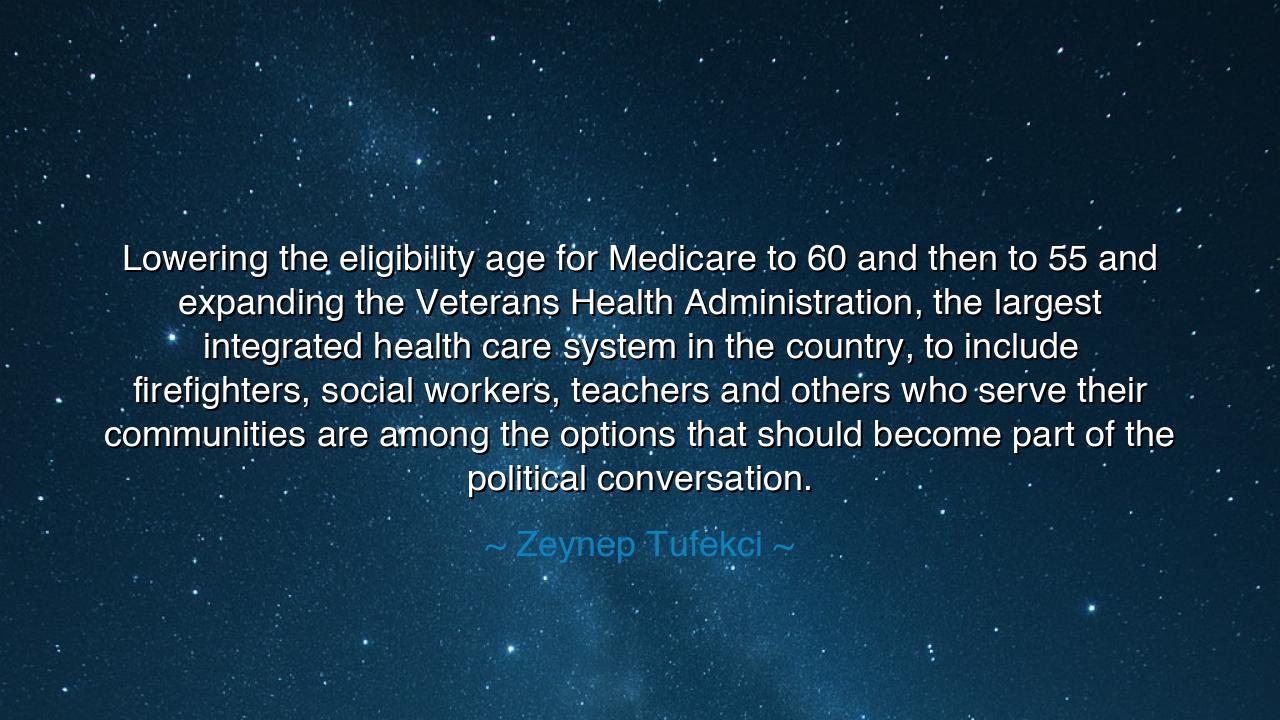
Lowering the eligibility age for Medicare to 60 and then to 55
Lowering the eligibility age for Medicare to 60 and then to 55 and expanding the Veterans Health Administration, the largest integrated health care system in the country, to include firefighters, social workers, teachers and others who serve their communities are among the options that should become part of the political conversation.






When Zeynep Tufekci said, “Lowering the eligibility age for Medicare to 60 and then to 55 and expanding the Veterans Health Administration, the largest integrated health care system in the country, to include firefighters, social workers, teachers and others who serve their communities are among the options that should become part of the political conversation,” she was not merely making a policy proposal — she was offering a vision of compassion made practical, of a society that remembers those who give their strength to sustain it. Her words call upon a truth both ancient and enduring: that a civilization’s greatness is measured not by the wealth of its few, but by the care it shows for its many.
At its heart, Tufekci’s message is about justice and gratitude. She speaks of the quiet heroes who walk among us — the firefighter who runs toward danger, the teacher who shapes minds, the social worker who heals invisible wounds. These are not warriors in the conventional sense, yet they serve their communities with no less courage. To include them within the embrace of a national system of care is not charity; it is honor paid where honor is due. Just as the veterans of war have earned the right to healing after service, so too have the veterans of daily life — those who bear the burdens of others in times of peace.
By invoking Medicare and the Veterans Health Administration, Tufekci links the moral with the structural — compassion with policy. She reminds us that empathy without action is mere sentiment. A just society does not stop at recognizing the worth of its people; it builds systems to preserve their dignity. In the ancient kingdoms, wise rulers knew this truth: that if the farmer, the soldier, the teacher, and the healer were not cared for, the realm itself would decay. The great Emperor Ashoka of India, after his conquests, turned his empire from war to welfare, building hospitals for humans and animals alike, decreeing that the work of healing was the noblest of labors. Tufekci’s vision is of that same spirit revived in modern form — where the machinery of governance serves the mercy of humanity.
The origin of her quote lies in her work as a sociologist and public thinker, one who bridges the world of data and the world of conscience. In a time of division and neglect, she calls us back to the idea that health — both physical and civic — is a shared inheritance. Her appeal for lowering the eligibility age of Medicare is not merely about numbers, but about inclusion. At sixty, many still labor under the weight of their professions; at fifty-five, countless more begin to feel the toll of years spent in service to others. To expand access is to acknowledge the cost of devotion, to admit that those who give much deserve rest and care before their bodies falter.
This vision finds resonance in the lessons of history. When the Athenian statesman Pericles spoke of democracy, he said that a city is great not when it rules over others, but when it takes care of its own. His Athens built public baths and provided stipends for its citizens to participate in civic life. They understood that a healthy people is a strong people. In much the same way, Tufekci’s call for expanding public health systems is not simply a plea for reform — it is a return to balance, a reawakening of an old wisdom: that the purpose of leadership is to guard the wellbeing of the governed.
Yet her quote also carries a subtle challenge — a warning against indifference disguised as practicality. In our age, it is easy to say that such reforms are impossible, that they cost too much, that the system cannot change. But history belongs to those who dare to imagine beyond what “is” toward what “ought to be.” Just as the abolition of slavery, the right to vote, and the creation of public education once seemed impossible, so too may universal care appear distant — until the will of the people makes it real. The political conversation she invokes must be one of courage, not caution; of hope, not hesitation.
Thus, the lesson of her words is this: a society that honors its servants must not abandon them to suffering. The nurse, the teacher, the firefighter, the soldier — these are the pillars that hold the house of civilization upright. To strengthen them is to strengthen the whole. Let each of us, in our own sphere, advocate for systems that reflect our collective compassion. Demand that policy serve people, not profit. Speak of fairness not as charity, but as justice.
For in the end, Tufekci’s quote is not just about healthcare — it is about the moral health of the nation. If we can care for those who care for us, we will have taken one great step toward the society the ancients dreamed of and the future still demands: a world where strength is measured not by conquest, but by kindness; not by wealth, but by the well-being of every soul within its care.






AAdministratorAdministrator
Welcome, honored guests. Please leave a comment, we will respond soon